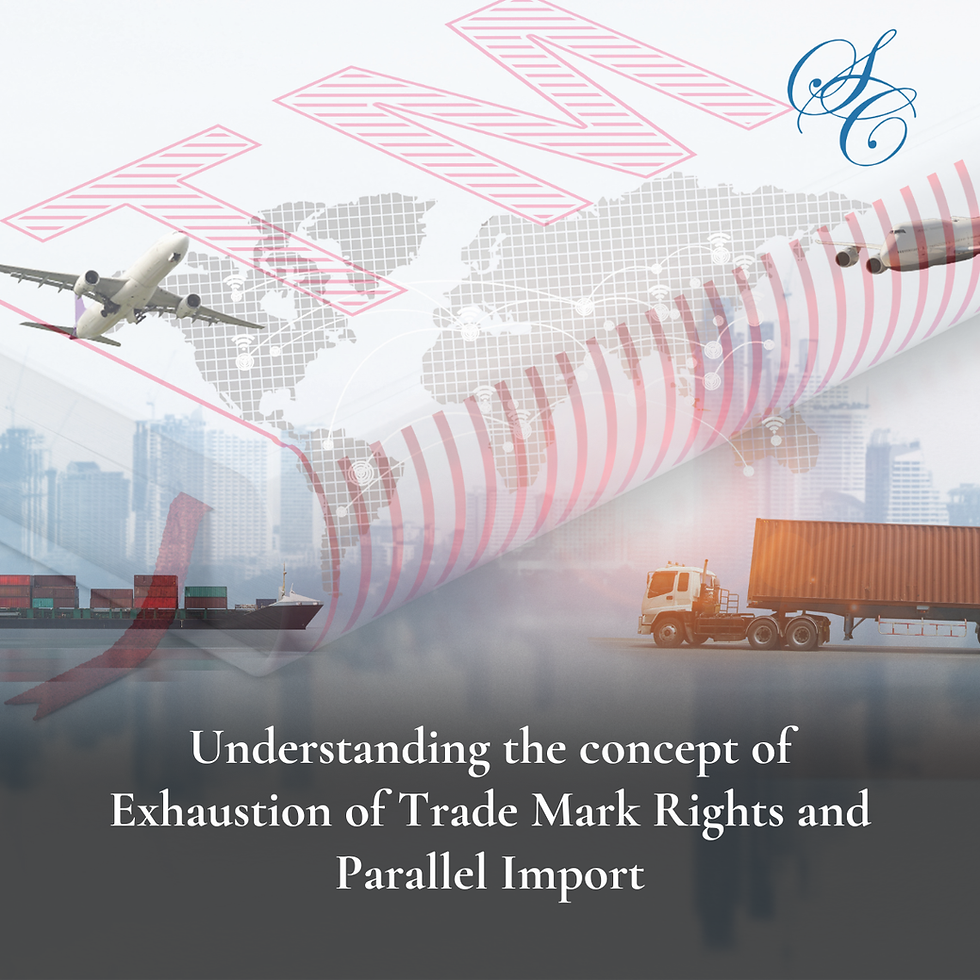COVID-19 – A Defence to Non-Use Claims in Cancellation Actions?
- Sarwajeet Singh
- Apr 30, 2020
- 4 min read
Our Senior Associate, Deeksha Anand discusses “COVID-19 – A Defence to Non-Use Claims in Cancellation Actions?”
The COVID-19 pandemic has brought the world to a standstill. India has been in lockdown mode since March 25. The pandemic begs the question – can it be used as a viable defence to a cancellation/rectification action based on non-use of a mark during the prescribed statutory period?
Before analysing this defence, it would be prudent to revisit what constitutes “use” of a trademark under Indian law. As discussed in our post, Non-Use Cancellation Actions in India, it is amply clear that use made merely to preserve rights in a trademark would be insufficient to ward off a non-use cancellation action. “Use” must be significant commercial use of the mark on or in relation to the goods/services under question. To this effect, even a single incidence of commercial and bona fide use in India during the relevant period would be sufficient to successfully defend a non-use cancellation action against a registered trademark.
Among other grounds, the law allows for removal of a trademark registration from the Register if, for a continuous period of five years and three months from the date on which the mark was entered into the Register, there has been no bona fide use of the trademark on/in relation to the goods/services covered by the registration. The law also states that a registered trademark is exempt from removal from the Register if “any non-use of a trade mark is shown to have been due to special circumstances in the trade, which includes restrictions on the use of the trade mark in India imposed by any law or regulation, and not to any intention to abandon or not to use the trade mark in relation to the goods or services to which the application relates.”
While the term “special circumstances” has not been defined, courts and tribunals have interpreted the term broadly. The Supreme Court of India, in Hardie Trading Ltd. & Ors. v. Addisons Paint and Chemicals Ltd.[1], recognized that economic viability or the existing market condition were within the concept of special circumstances and that even an economical impracticability would amount to special circumstances. In Hardie, the court also took into consideration the definition of special circumstances as discussed in Aktiebolaget Manus v. R.J. Full wood and Bland, Ltd.[2] as “some external forces as distinct from voluntary acts of any individual” ……… where the impact of local condition makes impractical the ordinary usage of international trade”.
In Cycle Corporation of India Ltd. v. T. I. Raleigh Industries Pvt. Ltd. and Ors.[3], the Supreme Court went a step ahead by putting the onus to show that non-user was strictly due to the special circumstances of trade, and not due to an intention to not use the trademark during the relevant period, on its registered proprietor. The court noted that if non-use was, in fact, due to some other circumstances and would have occurred whether the special circumstances had followed or not, the exception laid down in the law would not apply. In other words, non-use of the mark should not be due to some cause which would have operated, whether the special circumstances had arisen or not.
From the above, it is reasonable to conclude, in my opinion that, to be covered within the above exception, non-use must be due to external forces, such as, war, imposition of severe trade restrictions by a government or peculiar or abnormal circumstances that make it commercially impracticable and/or impossible for the registered proprietor to use a mark in India.
In my opinion, non-use of a mark owing to the COVID-19 pandemic would fall within the ambit of the definition of “special circumstances” envisaged by the law. Here, it is important to make a distinction between non-use during the lockdown and continuing non-use once the lockdown will end. While the nationwide lockdown would, in my opinion, be a legitimate defence to the non-use of a mark, the fate of non-use outside the lockdown period, but within the crisis period, will likely be decided on a case to case basis. Factors such as non-use by others in the same trade could be a consideration, for instance. This, alone, however, may not, in my opinion, be a sufficient defence against a cancellation action.
Once it is established that, owing to the COVID-19 pandemic or the lockdown, a registered proprietor was unable to use a mark during the relevant statutory period, it must be shown that the proprietor did not have any intention to abandon the mark. This intention not to abandon must be demonstrated irrespective of the pandemic/lockdown. Steps taken by a registered proprietor to continue use of the mark, either before or after the special circumstance ceases to exist, could help establish such non-intention to abandon the mark.
Lastly, COVID-19 is likely, and hopefully, to form a very small part of the relevant statutory period during which non-use of a mark is challenged. While parties defending non-use claims against registrations that become vulnerable to non-use cancellation during the COVID-19 pandemic may hide their non-use under the garb of the special circumstance created by the pandemic, this will surely not justify their non-use during the remaining relevant period.
Parties filing non-use cancellation actions in the times to come should factor in COVID-19 as a defence to non-use claims before deciding on the timelines to file the actions.
[1] 2003 (27) PTC 241
[2] (1949) 66 RPC 71
[3] AIR 1996 SC 3295




Comments